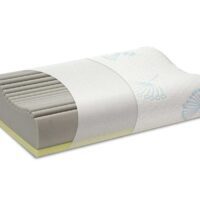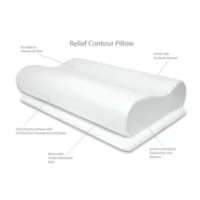Sleep Soundly
How to Find Your Perfect Pillow!
Your ideal pillow is designed to maintain a neutral stress-free alignment of your spine. However, since we are all built differently, like the three bears in Goldilocks, your best pillow may differ from that of your partner, child, or best friend.

What is the Best Pillow Type for You?
To choose the best pillow for you, consider the different types available in the market. The market offers a variety of pillows, each with a specific purpose. Some of the most common types of pillows are:
- Memory foam pillows: Viscoelastic foam makes up these pillows, which conform to your body's shape, giving you customised support.
- Down pillows: The soft and fluffy undercoating of geese or ducks fills these pillows, providing a plush and luxurious feel.
- Latex pillows: Natural or synthetic latex forms these pillows, which are recognised for their durability and support.
- Body pillows: These long, cylindrical pillows offer support for your entire body, particularly during pregnancy.
- Wedge pillows: Shaped like a triangle, these pillows elevate the upper body or legs, relieving acid reflux, snoring, or other medical conditions.
- Cooling pillows: These pillows regulate your body temperature and keep you cool throughout the night, making them ideal for hot sleepers.
- Buckwheat pillows: Filled with buckwheat hulls, these pillows conform to your body's shape, providing customised support.
How Often Should You Replace Your Pillow?
You should replace most pillows every 1-2 years since they gradually lose their firmness and ability to support your neck and head. Properly maintained high-quality pillows, on the other hand, can last for 5-7 years. It's time to replace your pillow if it becomes lumpy, flat, or discoloured.
What Should You Consider When Buying a Pillow?
When buying a pillow, you should consider several factors to make the best choice. These factors include:
- Sleeping position: Your preferred sleeping position should guide your pillow selection.
- Pillow filling: The filling of your pillow determines its level of support and comfort.
- Pillow size: Your pillow's size should match the size of your bed and body.
- Pillow shape: Different pillow shapes offer varying levels of support for different sleeping positions.
- Pillow cover: A good quality pillow cover should be breathable, hypoallergenic, and easy to clean.
- Pillow durability: You should opt for a good quality pillow that provides consistent support and comfort for several years.
- Price: Investing in a good quality pillow can enhance your sleep quality and overall health, despite a higher price not always guaranteeing a better pillow.












